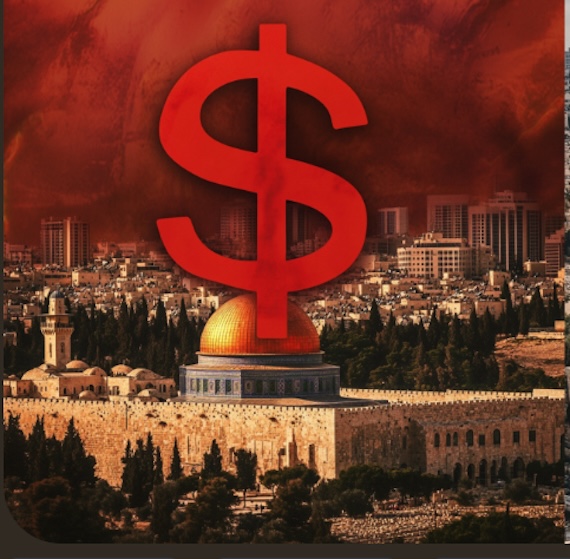Ann Arbor (Informed Comment) – Ta-Nehisi Coates made the argument for US reparations for slavery in 2014 in The Atlantic. In that essay, he made an analogy with German reparations to Israel. In his new book, The Message, Coates expresses regret for the unexamined Zionist biases in that analogy, which obscured the dispossession of the Palestinian people and their consignment to a form of Jim Crow — something he realized forcefully on a recent trip to Israel and Palestine.
Caribbean and African leaders of the British Commonwealth, CNN reports, are insistently raising the issue of British reparations for slavery and for Shanghaiing colonial subjects, shipping Indians off to Guyana and Fiji on false pretenses. British ships transported some 3 million Africans to the New World between 1640 and 1807, 400,000 of whom died in transit. The unpaid labor of these enslaved people and their descendants added significantly to Britain’s bottom line. Jamaica, one of London’s most profitable colonies because of the sugarcane trade (produced by slave plantations), figures Britain owes it $9.5 trillion.
Once we see that the Palestinians are a deeply injured party, it becomes clear that they are owed reparations. After World War I, the victors divvied up the defeated empires at Versailles and the satellite conference of San Remo. The League of Nations awarded the great powers “mandates,” giving them charge of territories on the grounds that they would administer them and also prepare them for independent statehood. This was a new form of colonialism, since the freebooters of the 18th century conquered countries like India purely for profit, with no obligation to ready it for independence. If it had been up to Winston Churchill, Britain would still be ruling India and taking money out of it to pay for his brandy and cigars.
As I point out in my new book, Gaza Yet Stands, the British Mandate of Palestine was peculiar compared to all the rest. The British Mandate of Iraq eventuated in an independent Iraq in 1932. Formerly German Tanganyika was a British Mandate and became independent in 1961. It joined with Zanzibar to become Tanzania in 1964. Syria, a French Mandate, became independent in 1946. The French Mandate of Togo became independent in 1961.
The British Mandate of Palestine, however, did not eventuate in an independent Palestine. The other League of Nations members, including France and Italy, remonstrated with Britain that it had to look after the native Palestinians, despite the Balfour Declaration of 1917 in which the British (who did not then rule Palestine) promised a “Jewish national home” there that, they pledged, would in no way disturb the locals.
Lord Curzon wrote in 1920, “As regards the Palestine Mandate, this Mandate also has passed through several revises. When it was first shown to the French Government it at once excited their vehement criticisms on the ground of its almost exclusively Zionist complexion and of the manner in which the interests and rights of the Arab majority (amounting to about nine-tenths of the population) were ignored. The Italian Government expressed similar apprehensions. It was felt that this would constitute a very serious, and possibly a fatal, objection when the Mandate came ultimately before the Council of the League. The Mandate, therefore, was largely rewritten, and finally received their assent.”
“Palestine Reparations,” Digital, Midjourney, 2024.
The League of Nations therefore demanded that the British Mandate of Palestine attend to the “interests and rights” of the 90% of its residents, who were native Palestinians.
When Palestinians revolted in 1936-1939 against the British policy of settling European Jews on their land, the British army brutally crushed them, with the help of Jewish militias like the Haganah. Embarrassed, the British commissioned the MacDonald White Paper of 1939, which pledged an independent Palestinian state by 1949, in which immigrant Jews would form a minority.
The British abruptly departed Palestine in 1948 and they failed to prevent the half-million Jews they had brought to Palestine from expelling 750,000 or so of the 1.3 million Palestinians from their homes and usurping all their property, leaving them stateless, homeless and penniless. Some 250,000 of those refugees were crowded into Gaza, where their descendants are now being genocided by the Netanyahu government.
The value of the land seized from the Palestinians at that time is estimated at over half a billion dollars in 1998 dollars.
But that $500,000,000 worth of property in 1948 is worth way more today.
The total value of Israeli real estate today is roughly $2.5 trillion, and in 1920 when the British accepted the charge of administering the Mandate of Palestine and turning it into and independent country for its citizens, the Palestinians owned virtually all the land in it.
I’d say that $2.5 trillion is a good place to start for British reparations to the Palestinians. That is roughly a year’s worth of the UK GDP. But I’m sure the Palestinians would accept an installment plan.



 © 2025 All Rights Reserved
© 2025 All Rights Reserved